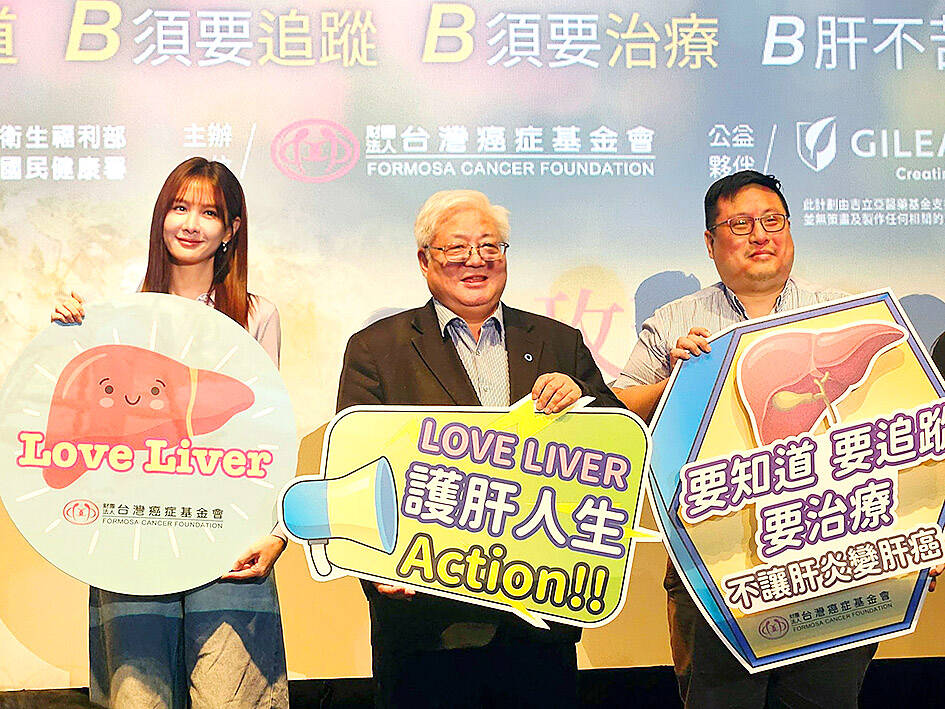Forty-six percent of people aged 40 or older do not know how hepatitis B can be transmitted, while about one-third of hepatitis B carriers do not seek routine testing or follow-ups, the Formosa Cancer Foundation said yesterday on World Hepatitis Day.
At a news conference in Taipei, the foundation announced the results of a survey on hepatitis B awareness and behaviors among people aged 40 or older and released a short promotional film.
More than 300 million people live with hepatitis globally and more than 2 million new cases are diagnosed each year, foundation deputy chief executive director Chang Chia-lun (張家崙) said, citing WHO data.

Photo: CNA
Taiwan began providing universal hepatitis B vaccination for newborns in 1986, which significantly reduced the incidence of hepatitis B and liver cancer in children, he said.
However, among people born before 1986 — now aged 40 years or older — the hepatitis B carrier rate is estimated to be about 10 percent, meaning there might be approximately 1.7 million hepatitis B carriers, and some carriers might not know their condition and have never received treatment, Chang said.
Hepatitis B is a leading cause of liver cancer, accounting for about 70 percent of cases, and some hepatitis B carriers can experience chronic liver inflammation, leading to increased risks of cirrhosis, liver failure or liver cancer, he said.
A survey commissioned by the foundation found four common misconceptions about hepatitis B among people aged 40 or older, he said.
Forty-six percent are unclear about the transmission routes of hepatitis B, while 40 percent mistakenly believe it can be transmitted by talking with or eating with a carrier, he said.
While 94 percent of respondents knew whether they were a hepatitis B carrier, many were unclear what that means, and of those who are carriers, about one-third said they did not seek follow-ups every year, he said.
About 33 percent of hepatitis B carriers have the misconception that they are healthy as long as they do not develop symptoms, but they should get regular follow-ups or even take drugs to control it, Chang said.
Of those who had taken medication to treat chronic hepatitis, nearly 40 percent said they stopped on their own, he said, adding that they should only stop after consulting with a doctor.
The survey also found that 59 percent of respondents did not know the government offers a free one-time hepatitis B and C screening for adults aged 40 to 79.
Health Promotion Administration Director-General Wu Chao-chun (吳昭軍) said that preventing hepatitis B and C and getting proper treatment for the diseases is critical for reducing the risk of liver cancer.
Eligibility of the one-time screening is on Friday to be expanded to include people born in or before 1986, so eligible people should get tested as soon as possible, he said.
World Hepatitis Day is observed each year on July 28 to raise awareness of viral hepatitis, an inflammation of the liver that causes severe liver disease and liver cancer. This year’s theme is “Hepatitis: Let’s Break It Down,” with the WHO calling for urgent action to dismantle barriers standing in the way of hepatitis elimination and liver cancer prevention.

The manufacture of the remaining 28 M1A2T Abrams tanks Taiwan purchased from the US has recently been completed, and they are expected to be delivered within the next one to two months, a source said yesterday. The Ministry of National Defense is arranging cargo ships to transport the tanks to Taiwan as soon as possible, said the source, who is familiar with the matter. The estimated arrival time ranges from late this month to early next month, the source said. The 28 Abrams tanks make up the third and final batch of a total of 108 tanks, valued at about NT$40.5 billion

Two Taiwanese prosecutors were questioned by Chinese security personnel at their hotel during a trip to China’s Henan Province this month, the Mainland Affairs Council (MAC) said yesterday. The officers had personal information on the prosecutors, including “when they were assigned to their posts, their work locations and job titles,” MAC Deputy Minister and spokesman Liang Wen-chieh (梁文傑) said. On top of asking about their agencies and positions, the officers also questioned the prosecutors about the Cross-Strait Joint Crime-Fighting and Judicial Mutual Assistance Agreement, a pact that serves as the framework for Taiwan-China cooperation on combating crime and providing judicial assistance, Liang

A group from the Taiwanese Designers in Australia association yesterday represented Taiwan at the Midsumma Pride March in Melbourne. The march, held in the St. Kilda suburb, is the city’s largest LGBTQIA+ parade and the flagship event of the annual Midsumma Festival. It attracted more than 45,000 spectators who supported the 400 groups and 10,000 marchers that participated this year, the association said. Taiwanese Designers said they organized a team to march for Taiwan this year, joining politicians, government agencies, professionals and community organizations in showing support for LGBTQIA+ people and diverse communities. As the first country in Asia to legalize same-sex

MOTIVES QUESTIONED The PLA considers Xi’s policies toward Taiwan to be driven by personal considerations rather than military assessment, the Epoch Times reports Chinese President Xi Jinping’s (習近平) latest purge of the Chinese People’s Liberation Army (PLA) leadership might have been prompted by the military’s opposition to plans of invading Taiwan, the Epoch Times said. The Chinese military opposes waging war against Taiwan by a large consensus, putting it at odds with Xi’s vision, the Falun Gong-affiliated daily said in a report on Thursday, citing anonymous sources with insight into the PLA’s inner workings. The opposition is not the opinion of a few generals, but a widely shared view among the PLA cadre, the Epoch Times cited them as saying. “Chinese forces know full well that